As part of MTSU’s Black History Month observance, MTSUNews.com met with some of the Black men and women who serve and protect the campus as members of its police department.
These law enforcement professionals shared their reflections on the role of Black History Month in their lives, discussed their career backgrounds and experiences and talked about maintaining the safety of a campus environment.
“One of the department’s goals is to better represent the community it serves,” said Jeff Martinez, administrative captain, which division includes recruitment. “We take surveys of our staff both (law enforcement) certified and non-certified to better recruit from and represent our community.”
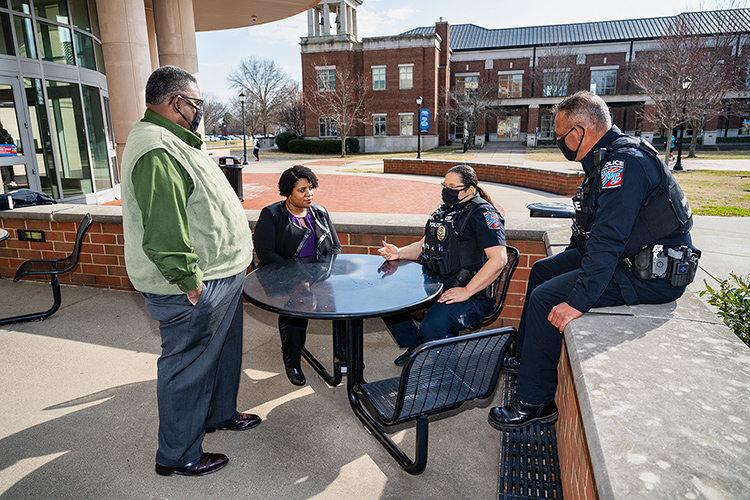
Middle Tennessee State University police officers and team members, from left, Leroy Carter, Vergena Forbes, Derrick Wharton and Joy Williams pose outside of the Student Union building on campus on Feb. 10, 2021. (MTSU photo by Andy Heidt)
The department’s current demographics come close to those of MTSU’s student body.
According to MTSU’s Office of Institutional Effectiveness, Planning and Research’s 2020 Fact Book, the student body population of the university is 18% African American for undergraduates and 14.9% for graduates.
The MTSU Police Department has 44 total employees, 13% of them Black.
“Recruiting African Americans into policing is difficult; however, we focus our efforts on recruiting from MTSU by being involved with the criminal justice program and employing students as student dispatchers, raider patrol and student IT,” Martinez said. “We have also formed relationships with the Black Student Union and other on-campus groups to find better ways to reflect our student body population.”
MTSU’s African American officers and dispatchers have a combined 110 years of law enforcement experience.
Read on to learn about each of these integral members of MTSU’s law enforcement community.
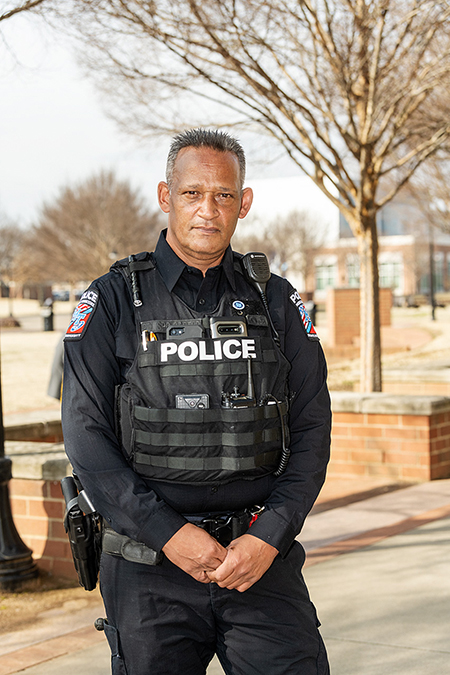
Leroy Carter
• Leroy Carter
• Patrol Specialist, fleet management
• 19 years in law enforcement
What made you want to work in law enforcement?
“Law enforcement has been my childhood dream,” Carter said. “Ever since I was a kid, I wanted to be a police officer. I accomplished this goal when I was age 37. I got hired on at MTSU. I’m (also) prior military.”
What is unique about being an officer for a campus community?
“As a campus police officer, you’re in a city that never grows old,” he said. “Every year you get the same (age) group of people 18-25, so you’re in a city that never grows old.”
What does Black History Month mean to you?
“For me, it’s not just February,” he said. “It’s all 12 months are Black History Month for me. With the (Buffalo Soldiers bike) club, we spread a lot of our history. In today’s society, the younger generation doesn’t know what happened. This (bike club) is bringing knowledge to them.”
How do you celebrate Black History Month?
“I celebrate it all year long,” Carter said.
What does it mean to you to be a Black law enforcement officer?
“To me, everyone is the same. It doesn’t matter what their (skin) color is. We’re all the same. We’re all doing the same job.”
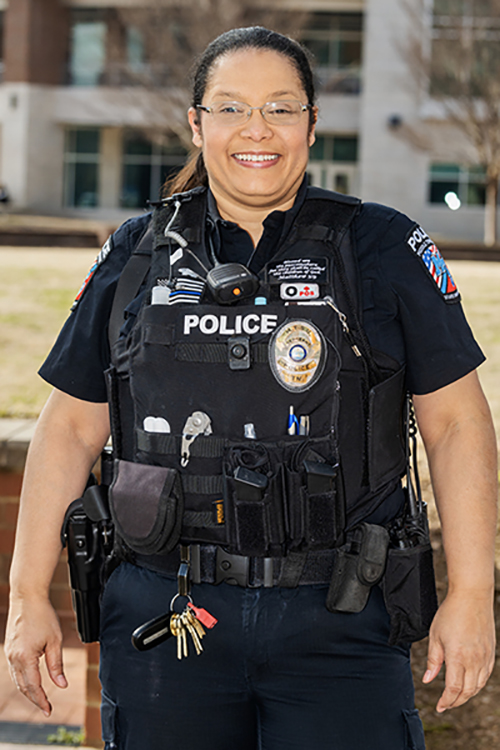
Vergena Forbes
• Vergena Forbes
• Community-Oriented Policing Sergeant and Raider Patrol Supervisor
• 30 years in law enforcement
What made you want to work in law enforcement?
“I have always wanted to be a police officer since I was a small child,” Forbes said. “If you asked me what I was going to do when I grew up, I would tell you ‘be a police officer.’”
What is unique about being an officer for a campus community?
“This job affords me the opportunity to interact with people in a positive manner whether providing information, instructions, guidance or simply directions to a specific location on campus,” she said. “Working at MTSU allows me the opportunity to help serve my community in a positive way. As an MTSU officer, I am afforded the ability to be more community-service oriented when interacting with the public, faculty, staff and students.”
What does Black History Month mean to you?
“Celebrating the history and culture of African Americans and the contributions they have made to this country from inventions that benefited industry to marching for equality and civil rights that gave me the right to vote,” she said.
How do you celebrate Black History Month?
“I participate in Black History month events held on campus and educate myself on how we as a people have helped to shape this country,” she said.
What does it mean to you to be a Black law enforcement officer?
“I enjoy my job and am proud to say that I am a Black law enforcement officer,” Forbes said. “I strive to be a positive example to all people regardless of race when doing my job … to enforce the laws of the state of Tennessee.”
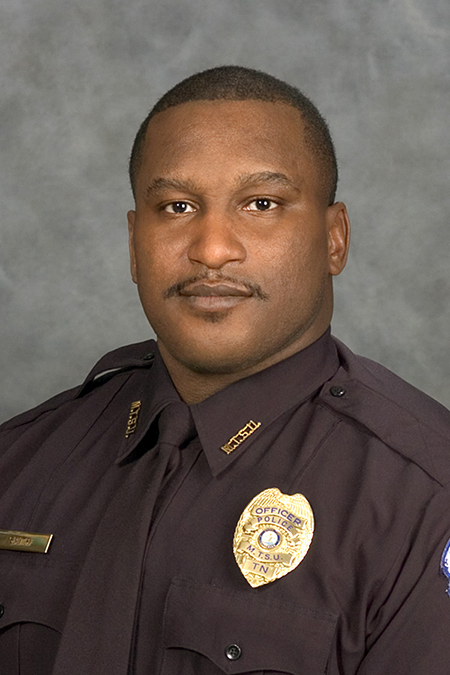
Demetrius Smith
• Demetrius Smith
• Lieutenant
• 18 years in law enforcement
What made you want to work in law enforcement?
“(I) wanted to be the face of change I felt law enforcement needed,” Smith said.
What is unique about being an officer for a campus community?
“Being a law enforcement/peace officer here at MTSU is unique and demanding,” he said. “Our community is one of great diversity and our department has encouraged us to get to know our community. Because we are in an academic setting, we are positioned to give assistance in a varied list of ways. Here the adage of ‘educate while enforcing the policies of MTSU and the laws of the state of Tennessee’ is a welcome stance.”
What does Black History Month mean to you?
“It means everything, so much so I celebrate it every day of each month year-round,” he said.
How do you celebrate Black History Month?
“I live it,” he said. “That’s the best way to show homage and thankfulness for and to the trailblazers before me: picking up the mantle and doing your part.”
What does it mean to you to be a Black law enforcement officer?
“A great dichotomy but a greater privilege,” Smith said, “during this time of addressing the challenges of both topics of racial and social justice being a Black man, a Black father and a Black peace officer is rewarding.”
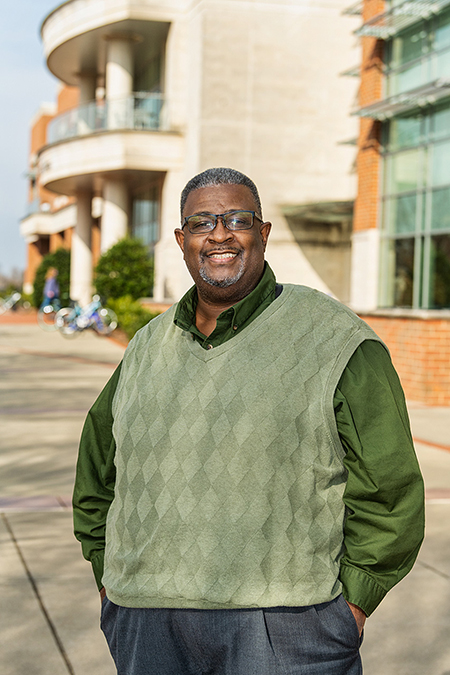
Derrick Wharton
• Derrick Wharton
• Detective
• 27 years in law enforcement
What made you want to work in law enforcement?
“Growing up in the inner city of New Orleans, I always wanted to help people in my neighborhood and community,” Wharton said. “I also enjoyed positive interactions with my peers and the elderly (lending an ear and being a sounding board, showing someone cared), which sparked an interest that one day I could make a difference in an area that had its share of drugs and crime.
“I thought I could help and serve my area in a positive way by changing the negative culture/stigma associated with a predominantly African American neighborhood/community. Additionally, I had several family members and family friends who were in the field of public service.”
What is unique about being an officer for a campus community?
“Being a police officer for a campus community (especially MTSU) has been a great and wonderful experience,” he said. “I consider MTSU a big melting pot, full of lively and vibrant people including students, faculty and staff who always have each other’s best interest at heart. Additionally, being a part of a community that focuses on high achievement and excellence. It goes without saying, being associated with a great law enforcement department is a plus.”
What does Black History Month mean to you?
“Personally, the month of February means everything to me,” he said. “Black History Month gives me the opportunity to reflect on my ancestors, those who sacrificed and went through the struggles (slavery) in America, so I could reap the harvest and enjoy the fruits of their labor. Additionally, Black History Month allows me to give homage to those who endured the mental and physical suffering because of the color of their skin. On the other hand, Black history gives me a great since of respect, pride and dignity, knowing through my ancestors’ struggles and death, I have been afforded many opportunities in life.”
How do you celebrate Black History Month?
“To celebrate and commemorate this special month, my wife and I watch documentaries on television (cable) and Netflix depicting the great African American (Black) history and the attributes (it) contributed to America,” he said.
What does it mean to you to be a Black law enforcement officer?
“To sum it up, being a Black law enforcement officer in America and MTSU is simply having pride, knowing I can make a difference in the world and on campus, treating everyone with respect know matter of his or her race, color, gender, origin, or ethnicity, just (on) the fact they are human beings,” Wharton said.
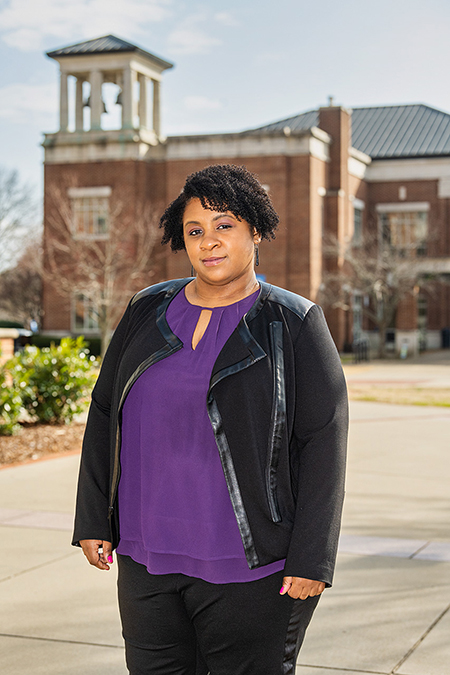
Joy Williams
• Joy Williams
• Communications Training Officer
• 16.5 years in law enforcement
What made you want to work in law enforcement?
“I became interested in working in law enforcement when I took criminal justice classes in college,” Williams said. “I’ve always had an interest in understanding how the law works, especially as it relates to applying it justly and fairly to everyone and not just to those with privilege.”
What is unique about being an officer for a campus community?
“Working for a college campus is unique in that there is more of a sense of community as opposed to working for larger city and county departments,” she said. “There is generally more time to develop friendly and trusting relationships among students, faculty and staff with the department, which helps the campus stay safer on the whole.”
What does Black History Month mean to you?
“Black History Month is a time that we use to reflect on and celebrate our history, culture, influences and contributions to the world,” she said. “We can’t ever forget where we come from, what we’ve been through and overcame and how those things shape us and determine where we will go as a people. It’s important to appreciate who we are so that future generations don’t allow society to diminish our abundant gifts to every culture.”
How do you celebrate Black History Month?
“To commemorate Black History Month, I usually make time to read and learn more about those who have or are currently advancing Black culture,” she said. “Being from Alabama, there are several museums and historic sites I’ve visited in this effort. I also now make an annual trip to Louisiana to immerse myself in our culture there, as it is unlike anywhere else probably in the world. On each of these trips, I visit a plantation to reflect and appreciate even more how far we have come.”
What does it mean to you to be Black and work in law enforcement?
“To be Black and working in law enforcement is to acknowledge that I and other Blacks work in a role that wasn’t traditionally meant for or open to Black people,” Williams said. “As such, we should continually examine policies, training and hiring practices to make sure that our best efforts are made to treat all citizens fairly while still protecting the communities in which we serve.”
MTSU Police is currently hiring for entry-level officers to join their diverse team and serve the campus community. For more information, visit the MTSU jobs website.
Stay connected to all campus safety and law enforcement updates by following MTSU police on Twitter, Instagram and Facebook.
— Stephanie Barrette (Stephanie.Barrette@mtsu.edu)
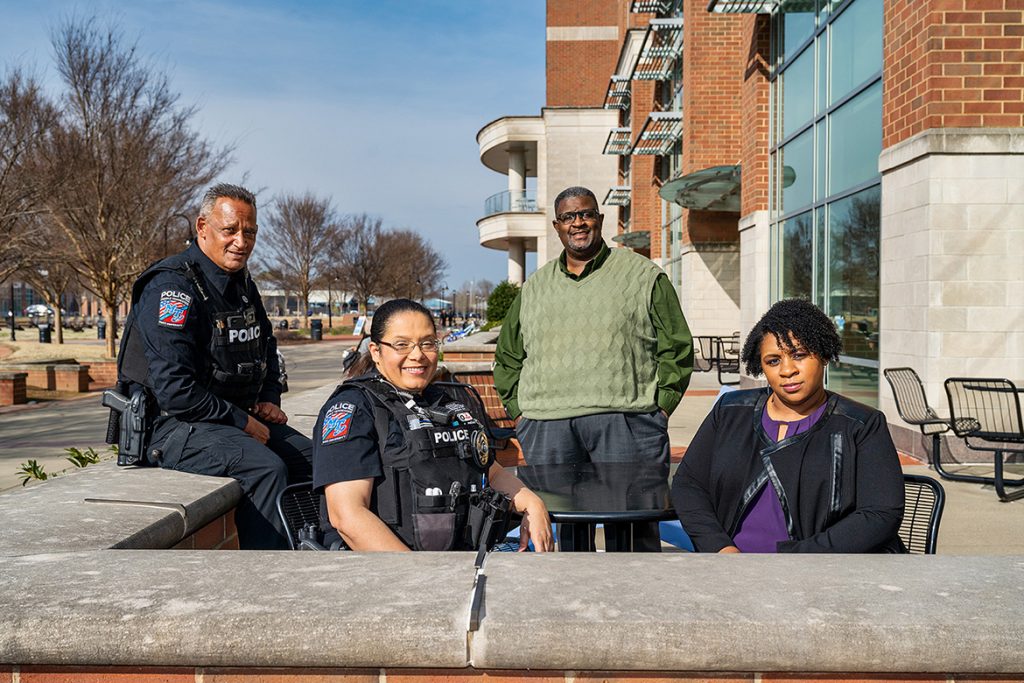
Middle Tennessee State University police officers and team members, from left, Derrick Wharton, Joy Williams, Vergena Forbes and Leroy Carter enjoy a sunny day on campus on Feb. 10, 20201. (MTSU photo by Andy Heidt)

COMMENTS ARE OFF THIS POST